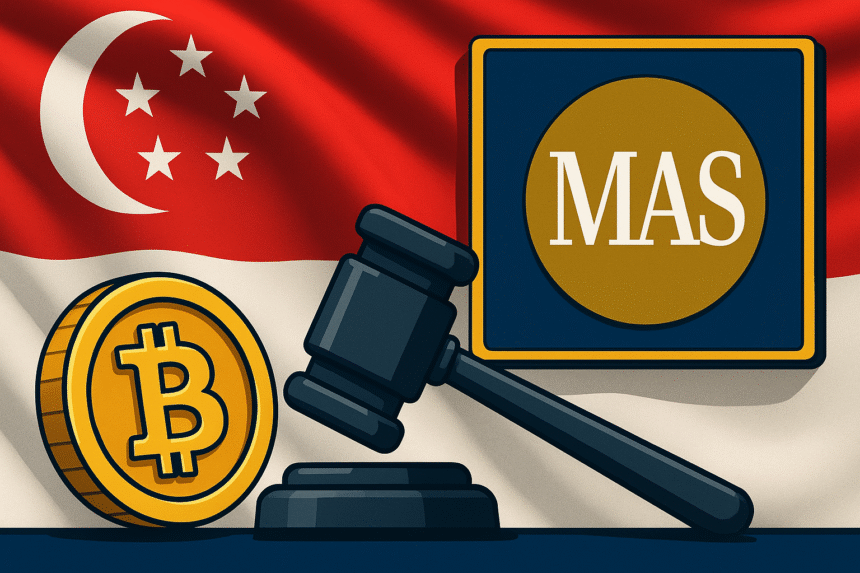– Ad –
| Getting your Trinity Audio player ready... |
Singapore, a global hub for digital finance, is tightening its grip on the cryptocurrency industry. The Monetary Authority of Singapore (MAS) has issued a bold directive: all local crypto firms without a Digital Token Service Provider (DTSP) license must halt services to overseas clients by June 30, 2025. This move, rooted in the Financial Services and Markets Act (FSM Act) of 2022, underscores Singapore’s commitment to balancing innovation with robust regulation. But what does this mean for crypto firms and the broader market? Let’s break it down.
What is the MAS Directive?
The MAS directive targets Singapore-based cryptocurrency firms offering digital token (DT) services, such as trading, custody, or payment processing, to overseas clients. By June 30, 2025, these firms must either:
- Secure a DTSP license, or
- Hold an existing license under the Payment Services Act, Securities and Futures Act, or Financial Advisers Act.
Firms failing to comply face steep penalties, including fines up to SGD 250,000 (about $200,000) and potential imprisonment. The directive, detailed in the MAS’s policy response, follows a consultation paper released on October 4, 2024, and aims to curb risks like money laundering in cross-border crypto activities.
Why is MAS Cracking Down?
Singapore has long been a beacon for crypto innovation, but the borderless nature of digital assets poses challenges. The MAS is focused on:
- Strengthening AML/CFT Measures: Digital tokens are vulnerable to money laundering and terrorism financing due to their global reach and pseudonymity.
- Protecting Financial Stability: Unregulated overseas services could expose Singapore’s financial system to risks.
- Maintaining Global Trust: By enforcing strict compliance, Singapore aims to solidify its reputation as a secure and regulated crypto hub.
This directive aligns with the FSM Act’s goal of creating a transparent, accountable digital asset ecosystem while fostering innovation.
Impact on Crypto Firms
The June 2025 deadline poses major hurdles for unlicensed cryptocurrency firms in Singapore:
- Licensing Hurdles: Obtaining a DTSP license requires a minimum base capital of SGD 250,000 and an annual license fee of SGD 10,000, alongside rigorous operational and compliance standards.
- Strategic Decisions: Firms must decide whether to pursue a license, restructure operations to focus solely on Singapore, or exit overseas markets entirely.
- Penalties for Non-Compliance: Failure to meet the deadline could result in fines, legal action, or reputational damage.
Smaller firms may struggle to meet these requirements, potentially leading to market consolidation. Meanwhile, licensed firms like Coinbase and Anchorage, part of Singapore’s 33 digital payment token license holders, stand to gain a competitive edge.
Singapore’s Crypto Landscape
Singapore continues to be a dominant force in the digital asset industry. With 33 licensed digital payment token providers as of June 2025, the city-state hosts major players like Coinbase, Anchorage, and others. The MAS’s proactive regulation has made Singapore a trusted destination for crypto businesses, balancing innovation with oversight. This latest directive reinforces that position, ensuring only compliant firms can operate globally from Singapore’s shores.
What’s Next for the Crypto Industry?
The June 2025 deadline could reshape Singapore’s crypto sector:
- Market Consolidation: Smaller, unlicensed firms may merge with larger players or exit the market, reducing competition.
- Increased Compliance Costs: Firms pursuing DTSP licenses will face higher operational costs, potentially passing these on to customers.
- Global Implications: As Singapore tightens rules, other jurisdictions may follow, creating a ripple effect in global crypto regulation.
For firms, the clock is ticking. Those unprepared for the deadline risk losing access to lucrative overseas markets. However, for licensed players, this could be an opportunity to capture greater market share in a regulated environment.
Conclusion
The MAS in Singapore is making it clear: adherence to regulations is mandatory. By June 30, 2025, unlicensed crypto firms must stop serving overseas clients or face severe consequences. This directive, while challenging for some, reinforces Singapore’s position as a global leader in regulated digital finance. Crypto firms must act swiftly—secure a DTSP license, adapt operations, or risk being left behind. As the deadline nears, global attention is on how Singapore’s crypto sector transforms.
FAQs
What is the DTSP license, and why is it required?
The Digital Token Service Provider (DTSP) license, mandated by the MAS under the FSM Act, allows firms to legally offer digital token services. It ensures compliance with anti-money laundering and financial stability regulations, especially for overseas operations.
What happens if a crypto firm misses the June 2025 deadline?
Unlicensed firms continuing to serve overseas clients after June 30, 2025, may face fines up to SGD 250,000, imprisonment, and reputational damage.
Which firms are affected by the MAS directive?
All Singapore-based entities providing digital token services, whether incorporated in Singapore or operating from there, must comply unless they hold a DTSP or other relevant license.
How does this impact Singapore’s crypto hub status?
The directive strengthens Singapore’s reputation as a regulated, secure crypto hub, attracting compliant firms while weeding out those unable to meet strict standards.

















